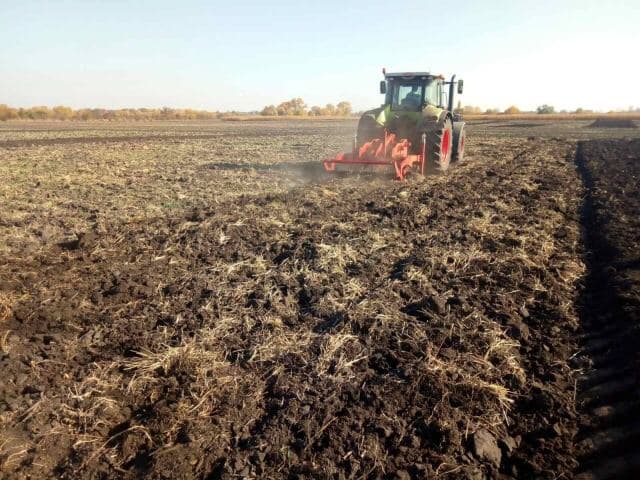
During the autumn sowing, the farmers of Odesa region faced a lack of moisture in the soil again. Agricultural producers from Rozdilnyansk, Odesa, Bilgorod-Dnistrovsk and Bolgrad districts of Odesa region spoke about this problem. After the drought that lasted in the region since the spring of this year, and led to the loss of winter crops on more than 300 thousand hectares in the southern districts of the region, some farmers had to sow almost into dry soil again.
"We sowed into dry land. We sowed 2,000 hectares of wheat and barley. Only last weekend it rained with snow. The total percentage of moisture is 16 millimeters. There was no significant precipitation for six months. However, what fell out was also not enough - the water did not combine with the deep moisture. The rains that passed earlier were light; the humidity was only 3-4 millimeters. But, due to the winds that are typical for our area and the high temperature, it evaporated quite quickly. We will hope that more precipitation will be added,” a member of UAC and the head of LLC “Iva” Yurii Mulenkov (from the Rozdilnyansk district of Odesa region) said.
Yurii Mulenkov's farm lost this year's crop because of the drought. They harvested an average of 200 kg per 1 ha of winter crops, sunflower - only 25 tons in total, sorghum, millet and buckwheat were lost completely. To sow seeds in autumn, sowing material was collected "every little bit helps": part of the grain was received from UAC as part of the association's assistance to its members, part was found independently.
Farmers of Odesa region have been suffering from drought for two years in a row. Due to the loss of crops, they faced a number of problems - inability to pay taxes, pay rent to shareholders, and take a loan due to negative account balances, accrual of "conditional" VAT on lost crops and problems with forward contracts due to inability to supply grain.
Agriculture producers have repeatedly asked the authorities for help, at least in paying taxes and rents. However, the funds were not received. The Ministry of Economic Development referred to the alleged lack of a mechanism for allocating funds, but UAC has repeatedly stressed that such mechanisms exist and funds could be allocated.
"We have the drought in the Odesa region more than a year. It is clear that the climate in the south of the country is changing and the state should react on this. Currently, a law on state support of agriculture has been adopted, which (at the suggestion of UAC) includes compensation programs for agricultural enterprises affected by natural disasters. It will be carried out on a non-refundable basis. UAC is also working with the State Tax Service about not charging "conditional" VAT on lost crops. And, with the Chamber of Commerce and Industry - work on the issuance of force majeure certificates. However, I am convinced that work in this direction should be systematic. And this is impossible without the development of irrigation in Ukraine and agricultural insurance. At the same time, unfortunately, we see that the item on the allocation of UAH 1.5 hryvnias, which was planned for next year for the development of irrigation, has disappeared from the draft state budget,” UAC Deputy Chairman Denys Marchuk said.
A bill on Water Users' Associations (WUA) has been presented to the Verkhovna Rada Committee on Agrarian and Land Policy. It provides for the establishment of WUA, where reclamation systems will be transferred for the ownership or temporary lease. Thus, law will regulate the possibility of attracting investments for the development of the irrigation system of Ukraine.
Also under discussion are changes to the daft law "On the features of agricultural products insurance with the state support", which includes the proposed UAC issues for agricultural producers income insurance. This type of insurance does not insure crops, but the farmers’ income, as it may decrease or be lost completely not only due to crop losses, but, for example, changes in market conditions. Thus, the main task of the agricultural producer remains high-quality cultivation of a crop with all technologies observance. If for some reason he does not receive the planned income, the insurance company compensates him this difference. This type of insurance is widespread in the United States, but it is quite expensive. Therefore, the bill provides that the state will compensate farmers up to 80% of the insurance payments cost.
UAC calls on the authorities to support these initiatives as necessary tools to assist farmers stand agains climate change.
Press service of UAC
Monday, 7 December 2020